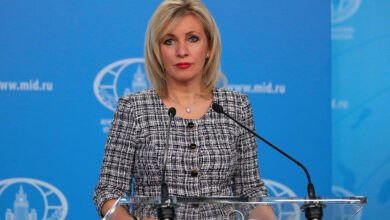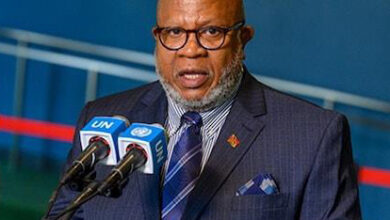Terror groups shredding the social fabric, Fight this inferno now- António Guterres
By R. Anil Kumar
-
“Poverty, inequalities and social exclusion give terrorism fuel
-
Prejudice and discrimination targeting specific groups, cultures, religions and ethnicities give it flame
-
Criminal activities like money laundering, illegal mining, and the trafficking of arms, drugs, stolen artifacts and human beings, help fill terrorist coffers.”- UN Chief
-
The root causes of terrorism – fragility and instability – must be addressed- António Guterres
UNITED NATIONS. António Guterres said terror groups were “shredding the social fabric of entire countries with the blades of violence, mistrust and fear”.

“In every case, civilians are paying the highest price and, in the end, all of humanity pays.”
Speaking at a meeting in New York on counter-terrorism initiatives across the continent, “Poverty, inequalities and social exclusion give terrorism fuel. Prejudice and discrimination targeting specific groups, cultures, religions and ethnicities give it flame,” said the UN chief, adding that criminal activities like money laundering, illegal mining, and the trafficking of arms, drugs, stolen artifacts and human beings, help fill terrorist coffers.
“Community by community, terrorist groups are extending their reach,” he said, adding that networks are widening, adding fighters and resources, and making common cause with transnational organized crime.
Terrorism represents the denial and destruction of human rights, the Secretary-General said “And so the fight against it will never succeed if we perpetuate the same denial and destruction.”
“But, we need urgent action on a much larger scale than we’ve seen to date,” the UN chief said.
Emphasize prevention
The root causes of terrorism – fragility and instability – must be addressed, he continued, pointing to the New Agenda for Peace he launched last July.
He said efforts to counter terrorism must be anchored in human rights and strategies focus on the marginalized and vulnerable and how counter-terrorism efforts can be aligned with the 2030 Agenda on Sustainable Development.
Launched in 2018, the Counter-Terrorism Compact is a network of 46 UN and non-UN entities. It also includes INTERPOL, the World Customs Organization and the Financial Action Task Force, which combats money laundering and terrorism financing.
‘Fight this inferno now’
Mr. Guterres said the crisis must be tackled head on before it spins out of control.
Since terrorism festers in complex crises with no region immune, the response to the threat needs to be multilateral and coordinated, said Mr. Guterres – citing some key UN tools that can help combat the scourge.
He pointed to the UN Global Counter-Terrorism Coordination Compact, which is helping countries implement the Global Counter-Terrorism Strategy.
The UN is helping regional organizations, working closely with civil society including victims of terrorism, religious leaders, women and young people, to shape counter-terrorism responses, policies and programmes.
He said there were four priority areas where the counter-terrorism community should direct its efforts.
Firstly, he said the UN Global Counter-Terrorism Strategy needed strengthening.
The second area of focus needs to be prevention, which means addressing the underlying conditions that lead to terrorism in the first place – such as poverty, discrimination, disaffection, weak infrastructure and institutions and gross violations of human rights.
This means “more than just foiling attacks and disrupting plots”. It is also necessary to ensure that counter-terrorism strategies and measures reflect all communities, constituencies and voices.
Identifying promotion of human rights as the third priority, the Secretary-General expressed his conviction that all counter-terrorism policies and initiatives should be based on respect for human rights. That should include the right to repatriation.
Finally, he called for more sustainable financing for counter-terrorism efforts.
“In the names of all those who have suffered and continue to suffer, and in the names of all victims and survivors, let’s intensify our work to create a future without terrorism”, he said.





